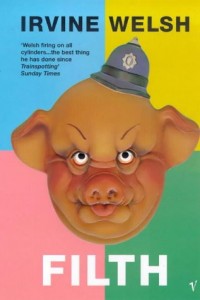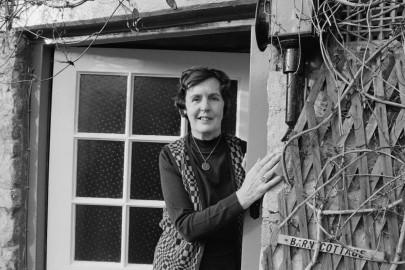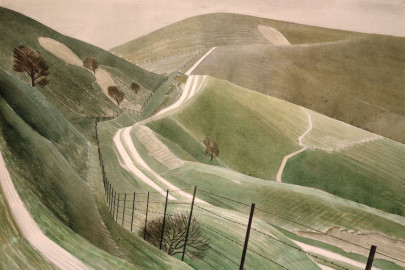My friend Mick Wall turned me on to Filth. Reading that sentence back I see that there are a few ambiguities in it, admittedly, but those aside, he did. ‘Have you read Filth?’ he asked one day when Irvine Welsh’s name came up. I hadn’t, but because Mick has rarely led me astray in literary matters, I did, right away.
Everyone should have a friend like Mick. We met when I was just out of college and had started working at a music mag where he was the star writer, getting the stories that all the other writers both wanted and envied. He had no reason to befriend me but he did. This was back at the end of the 1980s in London and he gave me a bit of an education in low life literature, showing me around the few places that sold Charles Bukowski’s books – the lovely Black Sparrow editions that sit on the shelves behind me – and then John Fante, and Celine; he practically forced me to buy Money – I picked it up on Waterloo Station one night on the way home, and it’s been my favourite book ever since. Mick has it in a first edition that I covet to this day. There’s lots more since, too, and not just the low life stuff either, but he understood what I should read when, which is important.
Anyway, Filth (available for 1p here). Along with everyone else, I’d read Trainspotting – at the time, in our line of work, not reading Trainspotting would have been like not having heard Appetite For Destruction or something – but then had sort of lost track of Irvine Welsh. I’d been put off of Filth by its cover, which had a cartoon of a pig in a policeman’s hat set on a lurid, coloured background. It seemed lowest common denominator. Having returned to the book many times since, I see that it is somehow appropriate, because Filth is a cartoonish and grotesque black comedy about a corrupt detective, but it’s a bit more than that, too.
Most importantly for a comedy, it is funny. Filth is set in Edinburgh and narrated by Bruce Robertson, a macho Protestant copper who, when the book opens, is being inconvenienced by the murder of a black tourist. The case, and Welsh’s vision of Edinburgh, unwinds through Robertson’s eyes, and what eyes they are. His main focus is a forthcoming holiday to Amsterdam with his hapless, henpecked mate Bladesy, so he is quickly off into one of Edinburgh’s Schemes to fit up a couple of druggies for the killing before his leave can be cancelled. At first it seems quite simple, but as the press become interested in the murder and its political implications, Robertson’s boss, Bob Toal, is forced into appointing a female officer to the investigation. Around this Welsh wraps several subplots: Bruce is infested with a tapeworm which gradually reveals the true circumstances of his life; a DCI job is going and Bruce presumes it’s his; Toal is writing a screenplay that Bruce is determined to destroy; Bruce is planning an affair with Bladesy’s wife and is posing as a stalker that he can later rescue her from. Yet plot in this novel is just background hum. Rather, like Money, it’s a voice novel, and as Smart Mart noted, when you write one of those, ‘all of your eggs are in one basket’. Welsh, admittedly with knowledge of his constituency, bets the house on Bruce, a vindictive, sexually sadistic misanthropic alcoholic, and on his voice, which is offered in phonetic dialect. Filth’s dark and sullen power comes from this – Welsh is a fearless writer, and they’re always the best kind. It is a novel of sordid events and sordid lives, and yet there is something about Bruce Robertson that provokes a gleeful delight, especially in the first half of the book when his star is ascendant.
What pushes Filth beyond broad comedy is Welsh’s Edinburgh, a city divided by religion and money. In one half are Robertson and the police, all Freemasons [ranks in the station are subverted by ranks in the Lodge], and in the other the Catholics and ‘Schemies’. In one telling scene, Bruce refers to a Hibs versus Hearts derby in which a winning Hibs goal is chalked off by a linesman from his Lodge.
Filth is imperfect – what book isn’t? The murderer’s identity is obvious from the start; Bruce’s childhood traumas and psychological dysfunctions come straight from the textbook, yet the humour is lethal and addictive. Bruce’s neighbour, a fading, much divorced professional footballer called Tom Stronach, appears in a series of glorious cameos, and the trip to Amsterdam with Bladesy is priceless. Welsh has a lot of fun too with Bob Toal’s screenplay, thuddingly titled ‘City Of Darkness’, which is a desperate middle-aged man’s fantasy. His eye and ear are acute, especially for discomfort.
There is talk of a film version soon, but unless they cast Jerry Sadowitz as Bruce, it’s hard to see it succeeding. Voice novels are in a way the purest form as they are the most difficult to transfer into another medium. That’s because they’re already at home. In Filth, there’s a demonic energy at play that you must read to experience.













Over on Quora, the Q&A site, there’s currently a question: ‘Irvine Welsh: where did it all go wrong?’ I’m inclined to ask it too. Filth was probably the last good one. Trainspotting was so imperishably wonderful that it must have been a hard act to follow and in the end he hasn’t. Maybe he didn’t really want to. I once heard a publishing anecdote, perhaps apocryphal, that he wanted to quit quite early on, but an editor asked him whether he really wanted to give up what he was then earning – around £10K royalties a day?
It being a contractual obligation of being a student at the time Trainspotting came out, I read it and found it a hoot, but gave up on Welsh after throwing The Acid House across the proverbial room. I think I might have Filth somewhere, unread, probably in the attic. I’ll have to dig it out.
Incidentally, the Trainspotting paperback we were all reading was notable for an amusingly understated testimionial on the front from something called Rebel Inc: “The best book ever written by man or woman… deserves to sell more copies than the Bible!”
I have a vague recollection of reading Filth but I must say that until I read your review the story had merged in my mind with all the other Irvine Welsh books I’ve read and I honestly couldn’t really recall what happens in it. But I have enjoyed all of his books, even if they have been declining in quality – The only person I can personally think of who is as good as Welsh at Voice Novels is Peter Carey
I think it might be another trait of voice novels that their plots are unmemorable. I’d read Money a couple of times before the ending became imprinted. It’s still the last thing I think of when I think of the book, and indeed the end of Filth is pretty perfunctory.
Jonathon made me think about whether it was his last good one, and it might be. Glue was ambitious and decent, but the Master Chefs and Crime don’t seem to have that real drive that his early books do.
Anyone up for the Trainspotting prequel?
One thing’s for sure- Porno, the Trainspotting sequel- was rotten.
“Rebel Inc” was Welsh’s first publisher, run by a guy called Kevin Williamson. It was a literary mag that later morphed into an interesting Canongate imprint before dissolving entirely.
The only “Filth” I ever read was by Dermot Todd (a nom plume of ResonanceFM’s Ed Baxter), a pamphlet long out of print, alas. A work of real genius, and thus ignored by what passes for “culture” in this age of pap. Irvine Welsh is (was?) fashionable, but perishable, and he will be forgotten soon enough.
I wonder if I could persuade Dr Baxter to reissue his “Filth”?